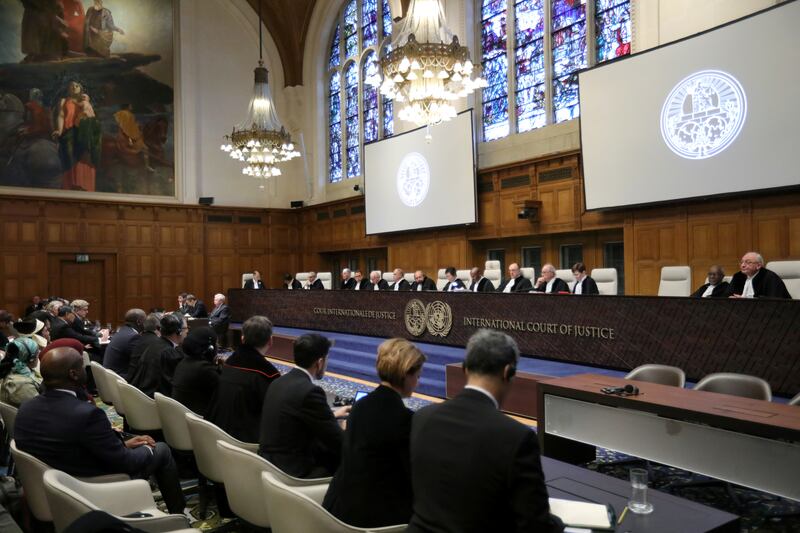Ethnic Rohingya refugees in Bangladesh will not return to their home in neighboring Myanmar’s Rakhine state unless they are granted equal rights and freedom of movement, they said Thursday, days after the junta announced that it is preparing for their immediate repatriation.
The junta’s Ministry of Foreign Affairs said on Feb. 20 that it is readying the return of “displaced persons from Rakhine state.” The announcement notably avoided both the use of the term “Rohingya,” a mostly Muslim ethnicity that the military says does not exist in Myanmar, and the term “Bengali,” which the junta favors and implies the group is originally from Bangladesh.
The junta statement also called for a meeting with the secretary-general of the Association of Southeast Asian Nations (ASEAN), saying that after agreeing to the bloc’s initial recommendations on the re-admission of displaced persons in Rakhine state, assistance is needed to implement them.
Rohingya refugees and activists in Bangladesh told the Myanmar Service of Radio Free Asia (RFA) on Thursday that they have no confidence the junta will act on the recommendations and said they need assurances their rights will be protected before they return. BenarNews is a unit of RFA.
Ali Jenner, a Rohingya refugee from the Baluhali refugee camp in Bangladesh’s Cox’s Bazar district, said he and others in the camp “have no trust in the junta at all.”
“If the Rohingya people can get equal citizenship, security rights, equal rights and all our original rights as other citizens there, then we can agree to go back,” he said.
The West African nation of Gambia filed a case at the ICJ in November 2019 accusing Myanmar of violating the 1948 Genocide Convention during the alleged expulsion of hundreds of thousands of Rohingya amid a brutal crackdown in 2017.
The ICJ, which is the judicial arm of the United Nations, began hearings on Feb. 21, the day after the junta statement on returning refugees, to determine whether it has jurisdiction to examine claims that atrocities committed by the Myanmar military against the Rohingya constituted a genocide.
The hearings are scheduled to last until Feb. 28 and will include arguments presented by representatives of Myanmar and Gambia
The junta’s defense lawyers — Christopher Staker and Stefan Talmon — have argued that Gambia submitted its case on behalf of the Organization of Islamic Cooperation and that the ICJ has no jurisdiction because the OIC is not a country. They also argue that Gambia is not an aggrieved country and has no right to sue Myanmar.
Gambia defended its right to sue Myanmar in an appeal issued on Feb. 23. Gambian Attorney General Dawda Jallow says the case was not only brought to the ICJ to protect the rights of the Rohingya, but to uphold Gambia’s rights as a signatory to the U.N. Convention on Genocide.

Response to pressure
Rohingya living in refugee camps in southeastern Bangladesh have said they are hopeful that the ICJ can bring justice for the Myanmar military’s rights violations against the ethnic minority group.
But others are wary of how the case may influence the junta in the near term.
Khin Maung, the founder of the activist group Rohingya Youth Union, who lives in Thinkhali Refugee Camp No. 13 in Bangladesh, said he cannot trust a junta statement he believes was issued as a response to international pressure.
“We welcome the fact that they want to call us home. But did they create necessary conditions for us to return to Rakhine state? That’s what we should be thinking about,” he said.
“[Junta chief Snr. Gen. Min Aung Hlaing] is trying to use us for his advantage. He is doing this because of international pressure and not because of goodwill. We are ready to go back, no matter who makes the decision to call us back, but it is impossible to return unless our requirements are met.”
Khin Maung said it is “impossible” for Rohingyas to return home without guarantees of citizenship or security and freedom of movement in the areas where they had previously lived. Discussions about a repatriation should first be held with the Rohingyas themselves, he said.
‘Crimes on a nationwide scale’
However, junta Deputy Information Minister Zaw Min Tun told RFA that the plan to repatriate the Rohingya was created long prior to the ICJ hearings and was not part of a bid to placate the international community.
He said the Rohingya had previously said they would accept the offer to return to Rakhine state, but that Bangladesh had refused to let them leave.
“We have been saying all along that we will accept and let them live as before. Accommodations were prepared,” he said.
“It’s just that they didn’t come back even after we made three or four offers. The other side did not release them … They are working on it with a political agenda.”
Rohingya activist Nay San Lwin told RFA that members of her ethnic group cannot expect that their rights will be respected by the junta when “the military is currently committing crimes against humanity on a nationwide scale.”
In the year since Myanmar’s military seized power from the country’s democratically elected government in a Feb. 1, 2021, coup, security forces have killed nearly 1,580 people across the country.
“Even if the Rohingya return, it will probably be just a handful,” Nay San Lwin said. “Most of them have said that they will return only if they can live in peace with the full basic rights they deserve.”
Reported by RFA’s Myanmar Service.
